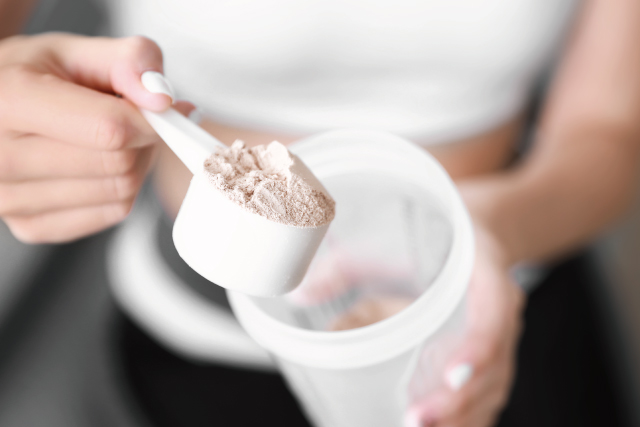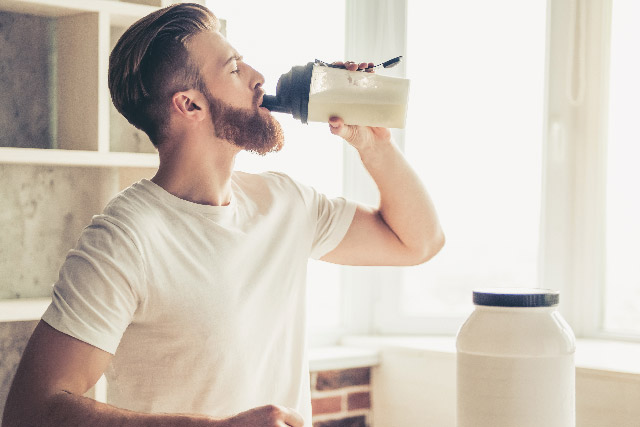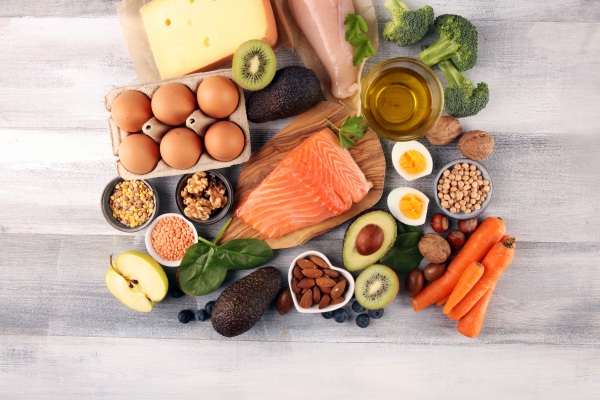Beverages and Protein Drinks
Innova Market Insights, a leading market research firm specializing in the food and beverage industry, indicates that the top ten global innovation trends for 2024 will prioritize proactive prevention of health issues and the blending of health products with indulgent foods. Over a third of consumers express a desire to prevent diseases, with a focus on weight management, heart health, and bone strength. Food and beverage choices are crucial for those seeking healthy aging, with enjoyable products boasting health benefits gaining popularity.
Beverages serve as portable nutrition, quickly replenishing essential nutrients with various flavors and functional benefits. The market segments include health-oriented functional drinks (RTD sports nutrition, dairy products, soft drinks), meal replacements, and protein powders tailored for specific demographics.
When classified by protein source, high-protein drinks fall into categories like animal-based, plant-based, and blended protein beverages. These include dairy alternatives (soy milk, peanut milk, oat milk, walnut milk, almond milk, coconut milk, etc.), dairy products (fermented milk, flavored milk), RTD sports protein, protein powder, and meal replacement proteins.
High-protein beverages can significantly enhance dietary protein intake when combined with other nutritious foods. From delicious hot drinks to refreshing ready-to-drink protein waters, they can be consumed at any time, providing a quick protein boost when needed.
The top claims in functional beverages are high protein content, energy boosts, and added vitamins and minerals. Protein makes up 82% of the health claims in both dairy and non-dairy products. Additionally, 66% of consumers in the US and Canada prefer meal replacement drinks, with protein shakes being the top choice.

Trends in High-Protein Beverages
High-protein drinks act as dietary supplements, helping individuals obtain protein that may be lacking in other food sources. They can be RTD beverages or protein powders derived from plant or animal sources. Plant-based options often include soy, pea, or rice protein, while animal-based protein powders typically come from milk or eggs.
Research shows that high-protein drinks can aid muscle gain, enhance exercise effects, and support post-workout recovery. For those on weight loss programs, they help maintain muscle mass.
Meal replacements and other beverages, including all meal replacement drinks (liquids and powdered forms) and other drinks positioned as nutritional supplements, can provide balanced nutrition or weight management. Between April 2021 and March 2024, the market has seen a 13.4% growth in high-protein beverages in North America.
In meal replacements and other beverages, protein sources range from common dairy options like whey protein concentrate (35%), calcium caseinate (23%), and milk protein concentrate (18%), to plant-based alternatives such as soy protein isolate (8%), brown rice protein (7%), and pea protein (23%). Even egg-based proteins, like egg white protein (10%), are used in carefully formulated recipes that drive product innovation.
A global analysis of high-protein beverage trends over the past two years, covering brands, product flavors, and protein content, is illustrated in three charts, all sourced from the Innova Database.
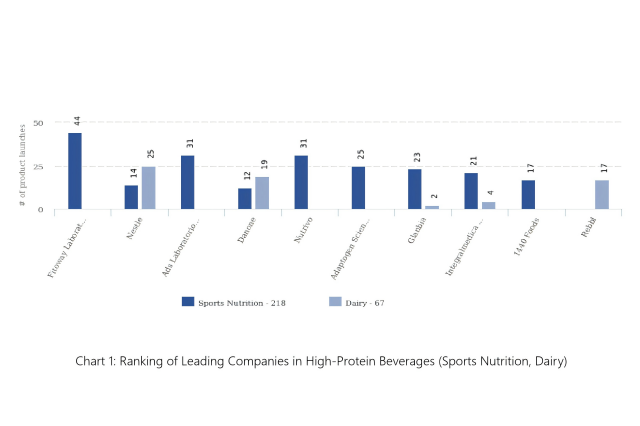

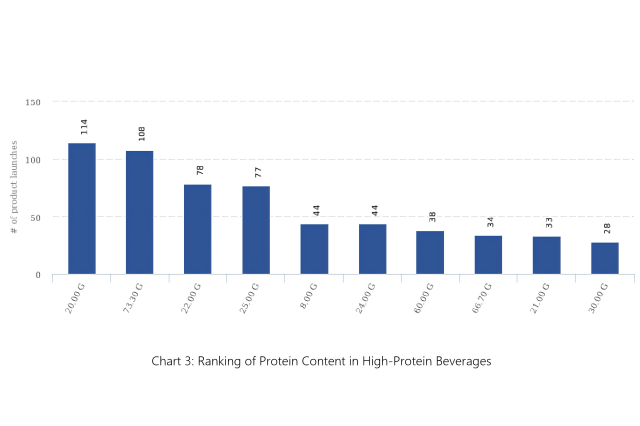
The charts reveal that high-protein beverages are primarily focused on sports nutrition, with Nestlé and Danone continuing to dominate the dairy sector. The most popular flavors are milk chocolate, vanilla, sea salt caramel, and strawberry. High-protein drinks with 20% and 73.3% protein content are leading the market.
Yeast Protein Drives the Trend in Protein-Diverse Beverages
Global consumer interest in overall health drives the demand for diverse products, including non-GMO, organic, vegetarian, and natural options. They are willing to spend more on products that promote physical and mental health.
Statistics show that from 2019-2020 to 2023-2024, plant-based products rose from 11.5% to 13.3%, while dairy products fell from 27.2% to 25.5%. In the realm of high-protein beverages, plant-based options are increasingly favored over dairy.
Overall, the demand for both plant and animal proteins is rising globally, leading to protein diversification as a market response. Yeast protein is emerging as a potential new star.
Angel Yeast Protein, as a pure vegan option, offers a complete protein with over 80% protein content, rich in all eight essential amino acids, and easily absorbed by the body. In addition to its high protein content, it contains various minerals and dietary fiber, helping regulate gut health. Yeast protein is derived from the fermentation of microbial brewer's yeast. It boasts high productivity and requires minimal land, water, and feed resources, making it more environmentally friendly.
Compared to plant proteins, yeast protein has a superior biological value (BV) and cost-effectiveness; compared to whey protein, it offers a price advantage and similar digestibility while being more widely accepted by those who are lactose intolerant.
Harnessing the complementary benefits of both novel and traditional proteins, yeast protein plays a key role in high-protein beverages by masking the unpleasant flavors of plant-based proteins while enhancing creaminess and richness. It also helps to balance the fishy taste of milk and seamlessly blends with other ingredients, making it easy to incorporate health and nutrition into delicious drinks. In sports nutrition products, yeast protein increases protein content, optimizes amino acid profiles, supports muscle synthesis, delays muscle decline, and enhances physical performance. For specialized functional beverages, yeast protein contains functional components like metallothioneins, which aid in storing, transporting, and metabolizing trace elements. These proteins also help eliminate hydroxyl radicals and detoxify heavy metals, giving yeast protein exciting potential in the pharmaceutical industry.
Globally, 31% of consumers seek foods and beverages that support bodily functions to improve health. High-protein drinks capture the public's desire for quick, nutritious options. The future may not just require specific proteins but a blend of multiple protein sources for optimal nutrition, with yeast protein paving the way for innovative, delicious high-protein beverages.
About Angel Yeast
Founded in 1986, Angel Yeast Co., Ltd specializes in the production of yeast and yeast derivatives. Its product range includes baker's yeast and ingredients, Chinese dim sum and seasoning, savory yeast extract, human health, animal nutrition, plant nutrition, distilled spirits and biofuels, microbial nutrition and enzymes. At present, Angel Yeast has 11 international advanced production bases in China, Egypt and Russia, and provides products and services for more than 150 countries and regions globally.
About Angel Yeast Extract-Savoury
Angel YE (yeast extract) made from edible yeast, by degradation the protein and nucleic acid in the yeast cells into nutritional seasonings with the application of modern biotechnology, has the advantages of increasing the fresh flavor, reducing salt, balancing the odor, strong tolerance and food properties, which promotes the global healthy operation of salt reduction and "clean label ".
Press Contact
ANGEL YEAST CO.,LTD
Address: 168 Chengdong Avenue, Yichang, Hubei 443003, P. R. China
Tel: +86-717-6369520, 6369558
Fax: +86-717-6370680
Email: yefood@angelyeast. com
